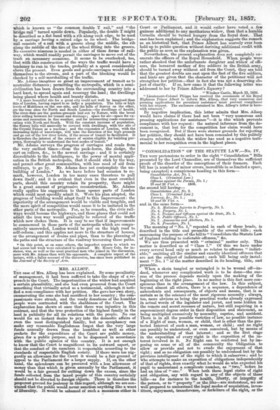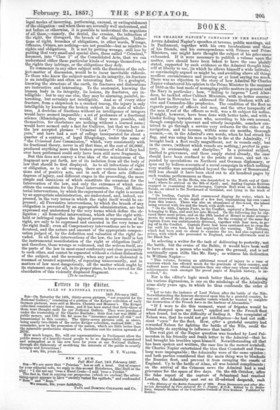"CONSOLIDATION" OF THE STATUTE LAW.--No. IV. THE very pretensions to
order in the eight " Consolidation " Bills presented by the Lord Chancellor, are of themselves the sufficient proofs of the disorder of the conceptions of their framers. Each bill has (a number of minor errors, incredible in so limited a space, being excepted) a conspicuous heading in this form—. Consolidation Act, No. 1. Class 1. (Criminal. Law.)
Offences against the .Person, No.1 ; 19 and 20 Vict. c. 1856.
the second bill having— Consolidation Act, No. 2. Class 1. (Criminal Law.)
_Larceny, N's. I.; 19 and 20 Viet. e. 1856.
and in the same form—
No. 3. Malicious InUtriee to Property, No. 1.
No. 4. Forgery, No. 1. No. 5. Treason and Offences against the State, No. 1. No. 6. Public Offences, No. 1.
No. 7. Accessories atzd Abettors, No. I.
No. 8. Procedure, No. 1. The meaning of "No. 1," repeated in each of these heads, is described in the title and preamble of the several bills ; each announcing the purpose of the bill to " Consolidate the Statute Law of England. relating to indictable offences," erc. We are thus presented with "criminal" matter only. This matter is described as of "Class I." Of this we have under every several head only so much as relates to offences "indictable," omitting all the similar and exactly identical offences that are not the subject of indictment ; each bill being only instalment "No. 1" of the matter described in its heading, title, and preamble.
When a skein tangled or untangled is to be wound off—indeed, whenever any complicated work is to be done—the success of the process depends mainly upon the making of the beginning at the right place. In no matter is this fad more conspicuous than in the arrangement of the law. In this subject, beyond almost all others, there is a sequence, a dependence of antecedents and consequents, of objects and means, that is as certain as in the sciences of the most rigorous necessity ; always, too, more obvious as being the practical works already expressed in actual words of the legislator and jurist, and none hidden in the remote and secret recesses of nature, but still requiring in a supererainent degree order in their disposition and statement, as being multiplied excessively by necessity, caprice, and. accident. There is in all the possible varieties of law, no possible instance of a Right of man, woman, or child, that is other than the protected Interest of such a man, woman, or child; and no right can possibly be understood, or even conceived, but by means of the understanding of that interest; and so the first stage in the exposition of every right is the exposition of the interest involved in it. No Right can be oonferred but by imposing on some or all of the community the Obligation to allow or provide and not to evade the enjoyment of that right ; and so no obligation can possibly be understood but by the previous intelligence of the right to which it subserves ; and he who attempts to make an exposition of obligations independently of that of rights, does exactly what be would do who expected his pupil to understand a complicate number, as "two," before he had an idea of "one." When both these legal states of right and obligation, say with regard to any of the objects of these hills—as for instance to the health, liberty, or integrity of the person, or to " property " or the like—are understood, we are well prepared to understand the legal modes of acquisition investiture, enjoyment, transference, or forfeiture of the right, or the
legal modes of incurring, performing, excusal, or extinguishment of the obligation: and when these are severally well understood, and not before or otherwise, it is possible to understand the negations of all these,—namely, the denial, the evasion, the infraction of the right, the disregard, the breach of the obligation. Infractions of right, breaches of obligations, in other words, Wrongs, Offences, Crimes, are nothing—are not possible—but as relative to rights and obligations. It is not by putting wrongs, still less by putting that very small and special class, those called "Criminal," foremost, into "Class 1" of the Consolidated Acts, that we can understand either these particular kinds of wrongs themselves, or the rights they infringe, or the obligations they defy.
To commence in any other subject with the fractures of the subject-matter of discussion, would be to incur inevitable ridicule. To those who know the subject-matter in.its integrity, its fracture is an intelligible and often an interesting fact. To a geologist, knowing the structure of the earth, its fractures and dislocations are instructive and interesting. To the anatomist, knowing the human body in its integrity, its lesions, its fractures, are intelligible: but to any one else, they may be alarming, painful, interesting, but certainly not intelligible. And so of every other fracture, from a shipwreck to a cracked teacup, the injury is only intelligible by knowing the broken subject in its state of wholeness. A doctrine of fractions without an intelligence of integers would have seemed impossible ; a set of professors of a fractional science (Rhiciologists, they would, if they were possible, call themselves, for charlatans are nothing without a learned name) would have seemed only a fact for Gulliver, but that we have in the law accepted phrases "Criminal Law," "Criminal Lawyers," and have had a sort of college incorporated for about a quarter of a century, of legal Rhagiology, under the name of "the Criminal Law Commission," which, very consistently with its fractional theory, never in all that time, at the cost of 50,000/., produced anything more than broken promises of what if they had ever been performed could only have been still mere fragments.
But this does not convey a true idea of the minuteness of the fragment now put forth, nor of its isolation from all the body of law that should be first displayed. As to all infractions of right or obligation, as to all wrongs, there are various kinds of omissions and of positive acts, and in each of these acts different degrees of injury, and different stages in the proceeding, the more simple and. inflexions of which constitute the occasions for the Intervention of the law, and only the extremes of which constitute the occasions for the Penal intervention. Thus, all Ministerial interventions, by which the enjoyment of the right is secured by an appropriate administration, are understood, and, indeed, expressed, in the very terms in which the right itself would be expressed ; all Preventive interventions, by which the breach of any obligation is prevented by an appropriate administration, are best expressed and understood by the very terms which define the obligation; all Remedial interventions, which after the right withheld or infringed replace the injured person in repossession of his right, are only to be expressed and executed in the very terms of the right itself; even all Compensatory interventions are to be understood, and the nature and amount of the appropriate compensation judged of, by the definition and valuation of the right invaded. In all these interventions of the law, the law itself is but
the instrumental manifestation of the right or obligation itself; and therefore, those wrongs so redressed, and the redress itself, are the parts of the law in most exact conformity and close proximity to each other, and cannot be separated without a violent dislocation of the subject, and the necessity, when any part so dislocated is resumed or treated separately, of repeating unnecessarily, and in matters of law most dangerously, all the matter which ought by its statement once for all, in its proper place, to have served for the
elucidation of this violently displaced fragment. G. C.



























 Previous page
Previous page